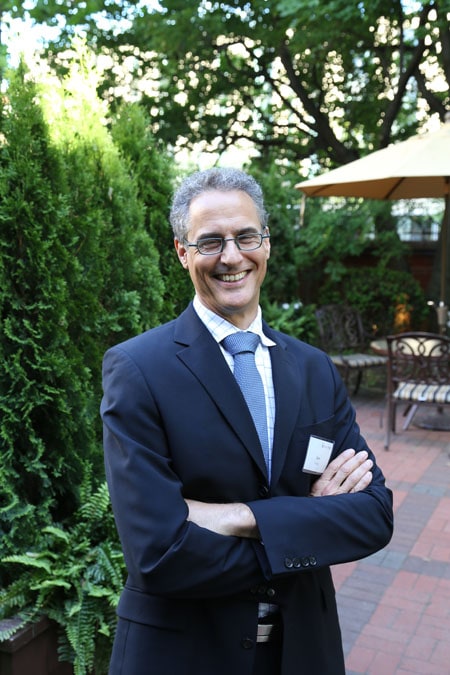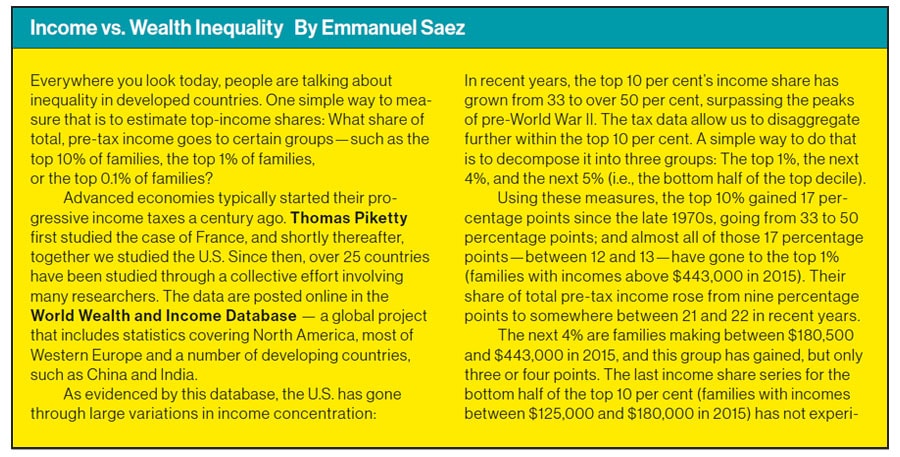
The politics of inequality
Politics of inequality is a system with its own momentum, and once it starts rolling down the hill in a negative direction, there's almost no stopping it
 Daniel Trefler, Economist, Rotman School of Management
Daniel Trefler, Economist, Rotman School of ManagementQ. How would you describe the difference between inequality in Canada and inequality in the U.S.?
In both countries, at one end of the spectrum, we have poverty, and on the other, we have the one per cent. Actually, I should say the .01 per cent, because that is the group I am most afraid of. In the U.S., this rarified group of some 10,000 families is frighteningly rich and powerful, and has increased its share of wealth vastly since the 1960’s. That shouldn’t come as a surprise to most people; we’re all used to reading about the CEOs of companies like Google becoming extremely rich. What is more disturbing is what is happening on Wall Street: In the last 30 years, its leaders’ share of all available U.S. profits skyrocketed from a modest eight per cent to 40 per cent. They now hold something like $15 trillion dollars’ worth of assets. These are extremely powerful individuals.
Q. Is this not an issue in Canada?
It is much less of a problem here. In Canada, inequality has grown substantially in comparison to Europe, but it has not grown much relative to what is happening in the U.S. I just saw some numbers for China, and inequality there is now almost as bad as in the U.S. This is a global issue.
Q. How would you frame the inequality issue in Canada?
There are three aspects to it, and each has to be approached in a different way. First, we are certainly seeing a hollowing out of the middle class. And looking ahead, the downside of artificial intelligence (AI) and machine learning is that lots of good white- collar jobs are going to disappear. Not tomorrow, and not in a decade, but maybe in a generation. We have to be concerned about that.
Secondly, there is the issue of the poor. Poverty is a horrific outcome for any rich country. As much as poverty in Canada is not as pronounced as some other countries, it is still at unacceptable levels. In particular, child poverty in this country is absolutely staggering.
Third, when we look at the people at the very top, we have to accept that it’s okay to have some extremely rich individuals in society; what is not okay is for those individuals to have a larger say in the political system than anyone else. Their views do not count any more than the rest of us. What is ultimately important is that the political system be allowed to function, shielded from the influences of the super-rich.

Q. Two types of inequality are discussed the most: Income inequality and wealth inequality. Which is the most pertinent to the issues we face today?
The one we should be focused on is wealth inequality—the unequal distribution of assets within a population. That is because ultimately, as indicated, the ability of very powerful individuals to sway elections and policy is driven not by what they earn each year, but by how much they build up and sock away in trusts and other tax-sheltered accounts.
Q. Policymakers in every country must decide where to focus their attention. If it were up to you, where would the Canadian government focus?
As indicated, we need three separate sets of policies. For the very poor, we absolutely have to make sure that our education systems are open, accessible and high quality—for all of our children. That is essential. In the U.S., in large swaths of the poorest parts of the country, measures of educational quality in the public school system are absolutely horrendous. We can’t let that happen in Canada. And we need to continue to make sure that there are resources available for our most disadvantaged children.
For the middle class, as I’ve said, we have to worry about the potential swing in employment away from the kind of jobs that the middle class is currently holding. Tackling this requires a lot of thought, and I don’t think any of us quite know how to approach it yet.
Then, at the top end, we have to examine the laws around campaign financing. We have to strengthen the role of the Commissioner of Elections Canada, whose power was diluted through the Harper government. It’s one thing to violate campaign financing laws; it’s another to actually be able to do something about it.
We also need to force the Trudeau government to do what they promised during the election, which is to move towards proportional representation. The current system allows for a minority of 35 per cent of the population, roughly, to have a majority in government. That means that, for the most part, the majority is not represented by their own government, and that is very unfortunate, because it provides a window for wealthy families to manipulate the political system. I’m very concerned about that.
Q. You have said that Canada’s banking system has a sort of ‘quid pro quo’ with the federal government. Please explain.
First, let me describe what the U.S systems looks like, to indicate the starkness of the differences. On May 27, 2009, in the depths of the financial crisis, President Obama called in the top 13 bankers in the U.S. to the oval office for a chat. His opening line was something like, “The only person who stands between you and the pitchforks is me.” By the time the meeting was over, you would think Obama would have extracted some enormous concessions from the banking industry—and that’s exactly what the banking industry was expecting. But when those bankers walked out, they looked at each other and asked, ‘What just happened in there?’ There was no ‘ask’ made of them; he basically let them off the hook.
That was a lost opportunity, and it would never happen here. In Canada, either the Minister or the small number of regulatory bodies that govern the banking and financial architecture of this country would have made phone calls to our most powerful CEOs, and they would have all nodded their heads and said, ‘We will implement what you are asking for. ’ The reason is simple: At the end of the day, banks make a lot of money in our societies, for two reasons. First, we live in a society where the rule of law is purchased, paid for and developed by taxpayers; so, the banks have embedded themselves in a tremendously powerful framework that allows them to function. This framework allows investors to trust that if they give their money to a bank, the bank can’t walk off with it—which allows the banks to grab all the more deposits, and invest them for even more profitability.
The second thing is that our banks receive ‘rents’, because they are regulated. You would think regulation would put a damper on banking activity; but in fact, the banks are often regulated by and for themselves, and that regulation translates into monopoly profits. In Canada, people recognize that there are a small number of very large, regulated chartered banks that are earning huge profits. But we live with that, because we think they are delivering something for those profits. And what they deliver—not to shareholders but to Canadian society—is financial stability. As a society, we have said that we are willing to pay for that.
Q. The U.S. banking system has never attempted this approach; in your view, could it solve some of its problems?
In the U.S., the bankers regulate themselves. The greatest evidence of that—and this speaks, I think, to the biggest problems that we are going to face with President Trump—is what is happening with the elimination of Dodd-Frank. It is clear that we need some form of more extensive capital requirements for banks. We can argue about the details of what that should look like, but we need more of it, because there has proven to be far too much financial instability.
If Dodd-Frank goes, basically, nothing will have changed between 2007 and now—except for the fact that the big banks have actually gotten bigger. By trying to get rid of Dodd-Frank, Trump is caving in to special interests, and this, I think, is what we should fear the most about his administration on the economic side: By example, he is saying ‘I am not going to divest myself of my own interests. I am going to make political decisions that will enrich me and my family personally, and that’s okay’. The message percolates out to the rest of the economy, and it’s the same message that Wall Street is hearing, which is, Dodd-Frank (and any financial regulations) should benefit me.
The first piece of legislation that Congress passed under Trump was getting rid of the requirement for fiduciary responsibility of brokers to their clients. So, the first thing the Trump administration did was say, caveat emptor—buyer beware. That is a mentality that harkens back to the crash of 1929. The first piece of legislation that was implemented in 1933 under Roosevelt was one demanding more transparency, not less.
Q. Do we compare the U.S. and Canada too much when we’re talking about inequality?
It’s great to understand and celebrate our differences, but it’s also important to recognize that throughout history, there has always been a battle between incumbent interests who want to take control of governments, versus entrepreneurial, innovative new sector players. The incumbents don’t want any competition, so they’re going to use any method they can to block it—and one of their favourite methods is government. We have seen this throughout history, and no country in the world is immune to it—including Canada. So, to look south of the border and see this process picking up steam should serve as a notice for all of us to be on guard.
Q. In terms of tackling inequality, what is one key lesson that we can learn from history?
One lesson is that the politics of inequality is a system with its own momentum, and once it starts rolling down the hill in a negative direction, there’s almost no stopping it. So, each and every one of us has to stand up and make our voice heard to say, ‘This is unacceptable’.
One of the great ironies of my view of the United States is that it is both heading in a horrific direction and the greatest country on earth. When you look at the freedom of the press in the U.S., and the ability for citizens to protest what is happening in Washington, it’s really unparalleled. We’ve seen great periods in American history where the vox populi has been very effective in peaceful ways: We had the power of the press in the muckraker movement; we had populism, New Dealism; we had the 60’s; and we had the missed opportunity of Occupy Wall Street.
Call me naïve and overly optimistic, but I firmly believe that there will come a time in the not-too-distant future when these types of popular voicing of discontent will have in influence in Washington, and we will see a major resetting of the politics of inequality.
Daniel Trefler is the Douglas and Ruth Grant Canada Research Chair in Competitiveness and Prosperity and Professor of Economic Analysis and Policy at the Rotman School of Management.
[This article has been reprinted, with permission, from Rotman Management, the magazine of the University of Toronto's Rotman School of Management]
X




